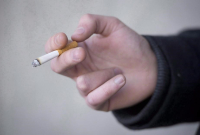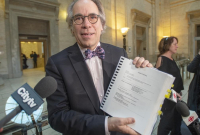Fines upheld for Quebec theatres where actors smoked during performances

Representatives from three Quebec City theatres said Wednesday a recent court ruling that upheld fines they received for allowing actors to smoke onstage will reduce creative choices and take some of the magic out of live performances.
The theatres had challenged the $500 fines on the grounds that the penalties were a violation of their freedom of expression.
But the act of smoking is not itself a form of expression, Quebec court Judge Yannick Couture wrote in his decision released Tuesday. The issue, he said, was not whether actors could play characters who smoke; rather, it was about how actors portray smoking onstage.
Quebec law permits actors to portray characters who smoke or to simulate smoking, "which constitutes the expressive content that is not banned," Couture wrote. "The ban is on the projection or inhalation of smoke from a tobacco product in a public place."
Smoking during a theatrical performance "is not expressive content, because no message is conveyed," he added.
Quebec's Tobacco Control Act stipulates that any products “that are put to one’s mouth to inhale any substance that may or may not contain nicotine” are forbidden in “enclosed spaces where activities of a sports or recreational, judicial, cultural or artistic nature are presented” or in any enclosed space where the public is admitted.
Louis-Philippe Lampron, a lawyer who helped represent the theatres, said Wednesday that context needs to be taken into account when the smoking ban is being enforced. Lampron, who is also a human rights professor at Université Laval, said that normally in cases involving charter rights, the judge first considers whether a right is being violated and then decides whether that violation is justified.
In this case, the judge decided that smoking wasn't a form of expression, even though smoking onstage is the result of a decision by the writer, director or other people working on the play, Lampron said.
"I'm really surprised by the decision and I think it sets a dangerous precedent for the artistic creators involved in all kinds of living arts," he said in an interview.
Anne-Marie Olivier, the artistic director of Théâtre du Trident, one of the three theatres fined, said the smoking scene in her theatre's production revealed how a character — an opera singer who had decided to stop singing — was sabotaging herself.
"When a performer decides to smoke onstage in character, it's to say something specific to the viewer," she said in an interview Wednesday. "For me, it has a specific meaning, so it's not true that it doesn't have meaning or it's not expressive.
"When we say to artists, 'you can't portray something realistically,' that's censorship."
Couture wrote in his decision that theatres could find other ways to depict smoking, including using special effects. He noted that they regularly find ways to show other illegal activities onstage, such as murder and drug use.
In all three cases, the actors were smoking cigarettes containing the herb sage, not tobacco, when the fine was issued.
"It's the only tobacco-free alternative we have," Olivier said. "If we had something else where we could create the hyperrealistic effect where you can inhale and exhale something, we would certainly use it."
Marc Gourdeau, the general and artistic director of Premier Acte theatre, which was also fined, said smoking can help the characterization of a character, era or a feeling. Using less-realistic props would "break the magic" and take people out of the moment, he said.
When Premier Acte theatre was fined in 2018, a Health Department spokeswoman said allowing smoking of anything in a location where it is forbidden violates the law.
Michel Nadeau, artistic director of Théâtre La Bordée, the other theatre to be fined, said representatives from the three theatres were to meet on Wednesday to decide what steps they would take next, adding that they hadn't decided whether they would appeal.
This report by The Canadian Press was first published Nov. 10, 2021.
This story was produced with the financial assistance of the Facebook and Canadian Press News Fellowship.





Comments